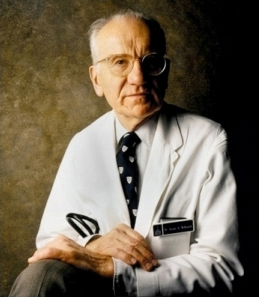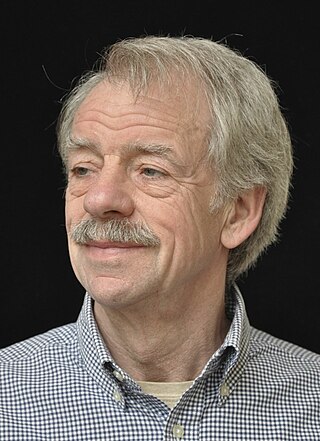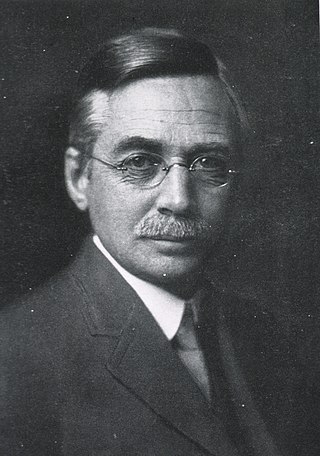Related Research Articles

Stanley Benjamin Prusiner is an American neurologist and biochemist. He is the director of the Institute for Neurodegenerative Diseases at University of California, San Francisco (UCSF). Prusiner discovered prions, a class of infectious self-reproducing pathogens primarily or solely composed of protein. He received the Albert Lasker Award for Basic Medical Research in 1994 and the Nobel Prize in Physiology or Medicine in 1997 for prion research developed by him and his team of experts beginning in the early 1970s.

Barry James Marshall is an Australian physician, Nobel Prize Laureate in Physiology or Medicine, Professor of Clinical Microbiology and Co-Director of the Marshall Centre at the University of Western Australia. Marshall and Robin Warren showed that the bacterium Helicobacter pylori plays a major role in causing many peptic ulcers, challenging decades of medical doctrine holding that ulcers were caused primarily by stress, spicy foods, and too much acid. This discovery has allowed for a breakthrough in understanding a causative link between Helicobacter pylori infection and stomach cancer.

Baylor College of Medicine (BCM) is a medical school and research center in Houston, Texas, within the Texas Medical Center, the world's largest medical center. BCM is composed of four academic components: the School of Medicine, the Graduate School of Biomedical Sciences; the School of Health Professions, and the National School of Tropical Medicine.

Victor Almon McKusick was an American internist and medical geneticist, and Professor of Medicine at the Johns Hopkins Hospital, Baltimore. He was a proponent of the mapping of the human genome due to its use for studying congenital diseases. He is well known for his studies of the Amish. He was the original author and, until his death, remained chief editor of Mendelian Inheritance in Man (MIM) and its online counterpart Online Mendelian Inheritance in Man (OMIM). He is widely known as the "father of medical genetics".

Anthony Stephen Fauci is an American physician-scientist and immunologist serving as the director of the National Institute of Allergy and Infectious Diseases (NIAID) and the chief medical advisor to the president.

Michael Thomas Osterholm is an American epidemiologist, Regents Professor, and Director of the Center for Infectious Disease Research and Policy at the University of Minnesota.

Harvey James Alter is an American medical researcher, virologist, physician and Nobel Prize laureate, who is best known for his work that led to the discovery of the hepatitis C virus. Alter is the former chief of the infectious disease section and the associate director for research of the Department of Transfusion Medicine at the Warren Grant Magnuson Clinical Center in the National Institutes of Health (NIH) in Bethesda, Maryland. In the mid-1970s, Alter and his research team demonstrated that most post-transfusion hepatitis cases were not due to hepatitis A or hepatitis B viruses. Working independently, Alter and Edward Tabor, a scientist at the U.S. Food and Drug Administration, proved through transmission studies in chimpanzees that a new form of hepatitis, initially called "non-A, non-B hepatitis" caused the infections, and that the causative agent was probably a virus. This work eventually led to the discovery of the hepatitis C virus in 1988, for which he shared the Nobel Prize in Physiology or Medicine in 2020 along with Michael Houghton and Charles M. Rice.
Vanderbilt University School of Medicine is a graduate medical school of Vanderbilt University located in Nashville, Tennessee. Located in the Vanderbilt University Medical Center on the southeastern side of the Vanderbilt University campus, the School of Medicine claims several Nobel laureates in the field of medicine. Through the Vanderbilt Health Affiliated Network, VUSM is affiliated with over 60 hospitals and 5,000 clinicians across Tennessee and five neighboring states, managing more than 2 million patient visits each year. It is considered one of the largest academic medical centers in the United States and is the primary resource for specialty and primary care in hundreds of adult and pediatric specialties for patients throughout the Mid-South.

Victor Joseph Dzau is a Chinese-American doctor and academic. He serves as the President of the United States National Academy of Medicine of the United States National Academy of Sciences. He was previously the president and CEO of Duke University Medical Center.

Jos W.M. van der Meer is emeritus professor and former chairman at the department of internal medicine of the Radboud University Nijmegen Medical Centre in Nijmegen, Netherlands. He is a member of the Royal Netherlands Academy of Arts and Sciences, of which he was vice president and chairman of the division of natural sciences (2006-2012). He is a member of Academia Europaea. Between 2014 and 2016 he was president of European Academies Science Advisory Council (EASAC). He performs research on cytokines and host defence, chronic fatigue syndrome and hyper-immunoglobulinemia D syndrome (HIDS). He is also active in graphic art and makes cartoons, for example for the Dutch science journal Mediator.
Bernard Nathan Fields was an American microbiologist and virologist. Fields was a member of the National Academy of Sciences.
Beth Cindy Levine was an American microbiologist. She was an investigator at the Howard Hughes Medical Institute (HHMI), Professor of Internal Medicine and Microbiology, Director of the Center for Autophagy Research and Charles Cameron Sprague Distinguished Chair in Biomedical Sciences at the University of Texas Southwestern Medical Center. She specialized in the field of autophagy; more specifically in its regulation and its role in diverse diseases, including cancer and infectious diseases. Levine was described as a pioneer in the field of modern mammalian autophagy.
Raman Viswanathan (1899–1982) was an Indian chest physician, medical mycologist and pulmonologist, considered by many as the father of Chest Medicine in India. He was the founder director of Vallabhbhai Patel Chest Institute, a postgraduate medical institute based in Delhi. An elected fellow of the American College of Chest Physicians, Royal College of Physicians of London, Indian National Science Academy and the Academy of Medical Sciences, United Kingdom, he was a recipient of several honors including the Forlanini Medal by Italian Tuberculosis Association and the Eugeno Morelli Prize of the National Academy of Sciences, Italy. The Government of India awarded him the third highest civilian honour of the Padma Bhushan, in 1974, for his contributions to medicine.
Peter Elsbach was a Dutch physician. He was professor of medicine at the New York University School of Medicine. He specialized in biochemistry, infectious diseases and natural anti-bacterial host defense.

David Arnold Relman is an American microbiologist and the Thomas C. and Joan M. Merigan Professor in Medicine, and in Microbiology & Immunology at the Stanford University School of Medicine. His research focuses on the human microbiome and microbial ecosystem—for which he was a pioneer in the use of modern molecular methods, as well as on pathogen discovery and the genomics of host response.
Dimitrios P. Kontoyiannis is the Robert C Hickey Chair in Clinical Care and Deputy Head for Research in the Division of Internal Medicine at The University of Texas MD Anderson Cancer Center in Houston, Texas. He received his medical degree as valedictorian Summa Cum Laude from the National and Kapodistrian University of Athens, Greece. Kontoyiannis was trained in Internal Medicine at Baylor College of Medicine in Houston, where he served as a Chief Medical Resident. He was subsequently trained as a clinical fellow in Infectious Diseases at Massachusetts General Hospital and obtained a master's degree in Clinical Sciences from Harvard Medical School in Boston. He spent three years at the Whitehead Institute for Biomedical Sciences/Massachusetts Institute of Technology as a fellow in the Harvard MIT Clinical Investigators Training Program.

Céline R. Gounder is an American physician and medical journalist who specializes in infectious diseases and global health. She was a member of the COVID-19 Advisory Board transition team of then-incoming U.S. president Joe Biden. In 2022, she joined the Kaiser Family Foundation as senior fellow and editor-at-large for public health at Kaiser Health News.
Ho Wang Lee was a South Korean physician, epidemiologist, and virologist. He was the first person in the history of medicine to be the one chiefly responsible for all 3 of the following steps: (1) discovery of the virus causing a human disease, (2) development of a method of diagnosis for the disease, and (3) development of a vaccine against the disease.

Ludvig Hektoen was an American pathologist known for his work in the fields of pathology, microbiology and immunology. Hektoen was appointed to the National Academy of Sciences in 1918, and served as president of many professional societies, including the American Association of Immunologists in 1927 and the American Society for Microbiology in 1929. He was the founding editor of the Archives of Pathology and Laboratory Medicine in 1926 and edited several other medical journals. He was knighted to the Order of St. Olav in 1929, and in 1933, he became professor emeritus of pathology at the University of Chicago. The Hektoen Institute for Medical Research—formerly the John McCormick Institute of Infectious Diseases—now bears his name.

Marc Lipsitch is an American epidemiologist and Professor in the Department of Epidemiology at the Harvard T.H. Chan School of Public Health, where he is the Director of the Center for Communicable Disease Dynamics. He has worked on modeling the transmission of Coronavirus disease 2019 (COVID-19).
References
- 1 2 Kimball, Harry R. (1 August 1994). "Sheldon M. Wolff, M.D., Tribute". The Journal of Infectious Diseases. pp. 261–264. doi:10.1093/infdis/170.2.261 . Retrieved 16 April 2020.
- ↑ "Members of the American Academy of Arts & Sciences (surnames beginning with the letter "W")" (PDF). American Academy of Arts & Sciences (amacad.org). Retrieved 16 April 2020.